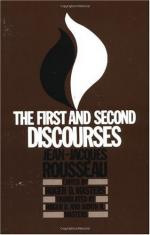
|
| Name: _________________________ | Period: ___________________ |
This test consists of 5 multiple choice questions, 5 short answer questions, and 10 short essay questions.
Multiple Choice Questions
1. What is man capable of doing according to Rousseau?
(a) Loving others.
(b) Ignoring the obvious.
(c) Improving oneself.
(d) Killing others.
2. What can magistrates easily usurp according to Rousseau?
(a) Power.
(b) Money.
(c) Lives.
(d) Properties.
3. What do the rich become when the new accumulation of riches is possible according to Rousseau?
(a) Usurpers.
(b) Tyrants.
(c) Thieves.
(d) Kings.
4. What does Rousseau say generates political distinction?
(a) Civil distinction.
(b) Money.
(c) Economical power.
(d) Religion.
5. What do not have regular form according to Rousseau?
(a) Totalitarian governments.
(b) Monarchies.
(c) Democratic governments.
(d) Early governments.
Short Answer Questions
1. Who tells the human to do good for himself and as little evil as he can to others?
2. What type of government is Rousseau concerned about in Chapter 3?
3. What does Rousseau encourage the youth to look forward to?
4. What does Rousseau claim people can look at to discover the current nature of humanity?
5. What is rooted in passion according to Rousseau?
Short Essay Questions
1. What natural enemies does man have, according to Rousseau?
2. What happens when we give up liberty?
3. How does Chapter 3 open?
4. What does Rousseau begin by supposing in Chapter 4?
5. What does Rousseau believe about those who create property rights in Chapter 5?
6. What is fraught with challenges according to Rousseau?
7. What happens as men acquire more?
8. What are the two conclusions about inequality that Rousseau traces at the end of Chapter 5?
9. What does nature give man?
10. What does Rousseau lament in Chapter 3?
|
This section contains 537 words (approx. 2 pages at 300 words per page) |

|




